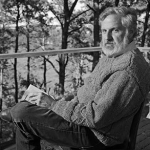The forest ended. Glad I was
To feel the light, and hear the hum
Of bees, and smell the drying grass
And the sweet mint, because I had come
To an end of forest, and because
Here was both road and inn, the sum
Of what’s not forest. But ’twas here
They asked me if I did not pass
Yesterday this way? “Not you? Queer.”
“Who then? and slept here?” I felt fear.
I learnt his road and, ere they were
Sure I was I, left the dark wood
Behind, kestrel and woodpecker,
When first I tasted sunlight there.
I travelled fast, in hopes I should
Outrun that other. What to do
When caught, I planned not. I pursued
To prove the likeness, and, if true,
To watch until myself I knew.
I tried the inns that evening
Of a long gabled high-street grey,
Of courts and outskirts, travelling
An eager but a weary way,
In vain. He was not there. Nothing
Told me that ever till that day
Had one like me entered those doors,
Save once. That time I dared: “You may
Recall”—but never-foamless shores
Make better friends than those dull boors.
Many and many a day like this
Aimed at the unseen moving goal
And nothing found but remedies
For all desire. These made not whole;
They sowed a new desire, to kiss
Desire’s self beyond control,
Desire of desire. And yet
Life stayed on within my soul.
One night in sheltering from the wet
I quite forgot I could forget.
A customer, then the landlady
Stared at me. With a kind of smile
They hesitated awkwardly:
Their silence gave me time for guile.
Had anyone called there like me,
I asked. It was quite plain the wile
Succeeded. For they poured out all.
And that was naught. Less than a mile
Beyond the inn, I could recall
He was like me in general.
He had pleased them, but I less.
I was more eager than before
To find him out and to confess,
To bore him and to let him bore.
I could not wait: children might guess
I had a purpose, something more
That made an answer indiscreet.
One girl’s caution made me sore,
Too indignant even to greet
That other had we chanced to meet.
I sought then in solitude.
The wind had fallen with the night; as still
The roads lay as the ploughland rude,
Dark and naked, on the hill.
Had there been ever any feud
’Twixt earth and sky, a mighty will
Closed it: the crocketed dark trees,
A dark house, dark impossible
Cloud-towers, one star, one lamp, one peace
Held on an everlasting lease:
And all was earth’s, or all was sky’s;
No difference endured between
The two. A dog barked on a hidden rise;
A marshbird whistled high unseen;
The latest waking blackbird’s cries
Perished upon the silence keen.
The last light filled a narrow firth
Among the clouds. I stood serene,
And with a solemn quiet mirth,
An old inhabitant of earth.
Once the name I gave to hours
Like this was melancholy, when
It was not happiness and powers
Coming like exiles home again,
And weaknesses quitting their bowers,
Smiled and enjoyed, far off from men,
Moments of everlastingness.
And fortunate my search was then
While what I sought, nevertheless,
That I was seeking, I did not guess.
That time was brief: once more at inn
And upon road I sought my man
Till once amid a tap-room’s din
Loudly he asked for me, began
To speak, as if it had been a sin,
Of how I thought and dreamed and ran
After him thus, day after day:
He lived as one under a ban
For this: what had I got to say?
I said nothing, I slipped away.
And now I dare not follow after
Too close. I try to keep in sight,
Dreading his frown and worse his laughter.
I steal out of the wood to light;
I see the swift shoot from the rafter
By the inn door: ere I alight
I wait and hear the starlings wheeze
And nibble like ducks: I wait his flight.
He goes: I follow: no release
Until he ceases. Then I also shall cease.


















Comment form: